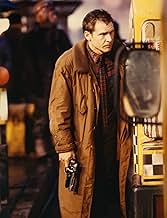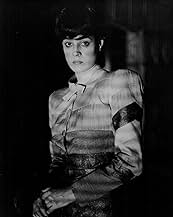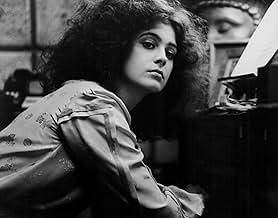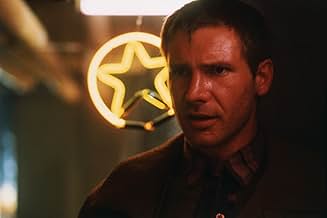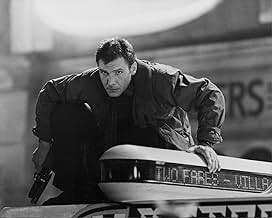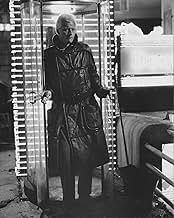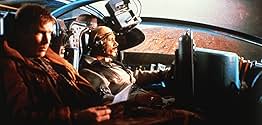Un Blade Runner deve perseguire ed eliminare quattro replicanti che hanno rubato una nave nello spazio e che sono tornati sulla Terra per trovare il loro creatore.Un Blade Runner deve perseguire ed eliminare quattro replicanti che hanno rubato una nave nello spazio e che sono tornati sulla Terra per trovare il loro creatore.Un Blade Runner deve perseguire ed eliminare quattro replicanti che hanno rubato una nave nello spazio e che sono tornati sulla Terra per trovare il loro creatore.
- Regia
- Sceneggiatura
- Star
- Candidato a 2 Oscar
- 13 vittorie e 22 candidature totali
Kimiko Hiroshige
- Cambodian Lady
- (as Kimiro Hiroshige)
Bob Okazaki
- Sushi Master
- (as Robert Okazaki)
Riepilogo
Reviewers say 'Blade Runner' is acclaimed for its deep themes, striking visuals, and intricate story, often noting its examination of humanity, identity, and artificial life ethics. Many commend its philosophical richness and immersive world, blending film noir with sci-fi. However, some find the pacing slow and characters underdeveloped. Debate exists over different cuts, with preferences varying between the original and director's cut. The soundtrack and special effects, though innovative, receive mixed reviews, with some considering them dated or mood-dependent.
Recensioni in evidenza
OK, I admit...the first time I watched this movie I detested it. But hey, I was 16 years old and had expected an action-packed sci-fi adventure. Blade Runner is not such a film. But I am grateful for this, for after maturing a bit and rewatching the movie a couple of times, I discovered its greatness. It is not a traditional sci-fi movie, it's a touching drama about the value of life and the importance of making the most of what you've got. One of the most important themes in the film is the question of what is more valuable - humans without emotions, or machines with? The film gives no answer - it just opens our eyes and makes us aware that we should be grateful for being alive.
Some people prefer the Director's Cut, but I like the original version better - mostly because of the wonderful end line: "I didn't know how long we had together. Who does?" That pretty much sums it up.
Some people prefer the Director's Cut, but I like the original version better - mostly because of the wonderful end line: "I didn't know how long we had together. Who does?" That pretty much sums it up.
This is simply Scott's finest hour. There are a sheer plethora of futuristic films with vision. Films which crudely grope into a possible time ahead,when perhaps a post apocalyptic era is scattered with cliché upon cliché and often miss the whole point. What Ridley Scott achieved with this film,is an entirely possible scenario. It really does feel like a science fiction novel brought to life,but not so much as its derivative penned by Phillip K Dick(do androids dream of electric sheep?). Its a grimy,violent world inhabited by the sick,lower class,villainous second citizens who haven't quite made the grade for the off world colonies. We have a true smelting pot of nationalities.The heavy eastern references within china town like inner cities is particularly poignant.
This film also sees Ford in perfect casting.Theirs a rye charm that Ford has that no other actor could fake or fill quite as effortlessly. Its a mixed review depending on what version you have seen. For me,the directors cut is simply too cut. I preferred the audience friendly screening which had the wonderful narration. The finest moment with this narration has to be the moments described by Batty in his dying eyes and the summing up by Ford of this man/machines passion and love for life.. No other sci-fi futuristic film has ever made the grade before or since in my humble opinion. It captured the raw smells and light of a brutal future scarily depicted in films or even so well. From the chase scene with Zora to the flybys over the city capturing a stunning skyline,chimneys and skyscrapers in one shot. This is my favourite movie of all time for all the reasons above and many more i could effortlessly type all day and night.
This film also sees Ford in perfect casting.Theirs a rye charm that Ford has that no other actor could fake or fill quite as effortlessly. Its a mixed review depending on what version you have seen. For me,the directors cut is simply too cut. I preferred the audience friendly screening which had the wonderful narration. The finest moment with this narration has to be the moments described by Batty in his dying eyes and the summing up by Ford of this man/machines passion and love for life.. No other sci-fi futuristic film has ever made the grade before or since in my humble opinion. It captured the raw smells and light of a brutal future scarily depicted in films or even so well. From the chase scene with Zora to the flybys over the city capturing a stunning skyline,chimneys and skyscrapers in one shot. This is my favourite movie of all time for all the reasons above and many more i could effortlessly type all day and night.
Blade Runner describes a future in which, through genetics, artificial humans are manufactured and called "replicants"; employees in dangerous jobs and slaves in the outer colonies of the Earth. Made by Tyrell Corporation under the motto "more humans than humans" -especially the "Nexus-6" models- not only resembles humans, they are far superior physically.
The replicants were declared illegal on planet Earth after a bloody mutiny occurred on the planet Mars, where they worked as slaves. A special police force, Blade Runners, is in charge of identifying, tracking and killing - or "withdrawing", in terms of the police itself - the fugitive replicants found on Earth. With a group of replicants loose in Los Angeles, Rick Deckard, the best agent that has existed in regard to the recovery and removal of the replicas, is removed from his semi-retirement to use some of "the old magic blade runner".
Ridley Scott fantastic dark cyberpunk style and futuristic design is so well made that accomplished to create a visual vocabulary: neon lights, abandonment, decay, loneliness, obscurity, indifference and alienation are the core of the aesthetics of the film, which will eventually become and serve as a pattern for successive cinematographic works.
The script David Webb Peoples adapted from 'Do Androids Dream of Electric Sheep?' takes the viewer into a dwelling and philosophical controversy, as it creates doubt and empathy to the so called replicants, primarily as seen in many shots of Rick Deckard hesitating about the true nature of his task.
Harrison Ford and Rutger Hauer haunts the attention into the essence of the story. Their characterization throughout infiltrates the different conceptions of life. A saddened soul searching for the meaning of his punished existence and the other, ruminating a task sinking him into a moral void brimming with guilt.
At the end, the movie leaves you wondering about the implications the creation of highly intelligent beings (IA) must have and, if it's worth treating them as machines or they have become so human that the difference is non existent.
"Time... to die".
10/10.
The replicants were declared illegal on planet Earth after a bloody mutiny occurred on the planet Mars, where they worked as slaves. A special police force, Blade Runners, is in charge of identifying, tracking and killing - or "withdrawing", in terms of the police itself - the fugitive replicants found on Earth. With a group of replicants loose in Los Angeles, Rick Deckard, the best agent that has existed in regard to the recovery and removal of the replicas, is removed from his semi-retirement to use some of "the old magic blade runner".
Ridley Scott fantastic dark cyberpunk style and futuristic design is so well made that accomplished to create a visual vocabulary: neon lights, abandonment, decay, loneliness, obscurity, indifference and alienation are the core of the aesthetics of the film, which will eventually become and serve as a pattern for successive cinematographic works.
The script David Webb Peoples adapted from 'Do Androids Dream of Electric Sheep?' takes the viewer into a dwelling and philosophical controversy, as it creates doubt and empathy to the so called replicants, primarily as seen in many shots of Rick Deckard hesitating about the true nature of his task.
Harrison Ford and Rutger Hauer haunts the attention into the essence of the story. Their characterization throughout infiltrates the different conceptions of life. A saddened soul searching for the meaning of his punished existence and the other, ruminating a task sinking him into a moral void brimming with guilt.
At the end, the movie leaves you wondering about the implications the creation of highly intelligent beings (IA) must have and, if it's worth treating them as machines or they have become so human that the difference is non existent.
"Time... to die".
10/10.
Just my personal opinion. Everything is perfect about this movie. I saw the movie the first time when I was 12 and it was mind blowing for me. 38 years later I feel the same about this movie. Timeless and beautiful. For me 10/10 with a star and smile
Rick Deckard is given an assignment to 'retire' several biologically engineered fugitives.
The plot follows Deckard as he hunts replicants, falls in love and questions his own humanity. It moves slow, allowing you to take in all the sights and sounds of 2019 Los Angeles (as imagined in 1982), whilst pondering some of its themes.
The imagery and dialogue associated with what defines a sentient being and what makes us human is compellingly portrayed. The device used to explore these themes is the genetically engineered humanoid life-form, the godlike status of its creator and the morally compromised nature of the ordinary human. Additionally the number of references to the eyes and linking of what we see and remember versus what is fake and reality, is cleverly mixed into the story. If you want in depth analysis, google 'Blade Runner Themes and Motifs'.
The character of Roy Batty has been interpreted as both a religious and philosophical allegory, but these theories are debatable. He is for me the most intriguing character in the movie and his final scene is one of the most memorable of all time. Along with Deckard, it made me wonder if there is any real difference between humans and replicants. He is portrayed wonderfully by Rutger Hauer who both looks and acts the part.
Deckard is impressively played by Harrison Ford, who is perfect for movies with an emphasis on visuals. Ninety percent of his power as an actor comes from his screen presence and soulful facial expressions. His scenes with Sean Young young are as touching as the action scenes are brutal.
One of Blade Runner's most memorable aspects is its depiction of 2019 Los Angeles, with its permanently dark rainy skies, overcrowding, neon lights, high concept technology, urban decay and environmental devastation. Take away the flying cars and off-world colonies and it's not far off an accurate prediction.
I could write about the atmospheric cinematography, artistic designs and special effects, but nothing I can say would do it justice.
The question of whether Deckard is replicant or human is interesting. There is evidence of both but you must watch and decide. Does it matter? Probably not. If I had to decide, I'd say replicant.
The plot follows Deckard as he hunts replicants, falls in love and questions his own humanity. It moves slow, allowing you to take in all the sights and sounds of 2019 Los Angeles (as imagined in 1982), whilst pondering some of its themes.
The imagery and dialogue associated with what defines a sentient being and what makes us human is compellingly portrayed. The device used to explore these themes is the genetically engineered humanoid life-form, the godlike status of its creator and the morally compromised nature of the ordinary human. Additionally the number of references to the eyes and linking of what we see and remember versus what is fake and reality, is cleverly mixed into the story. If you want in depth analysis, google 'Blade Runner Themes and Motifs'.
The character of Roy Batty has been interpreted as both a religious and philosophical allegory, but these theories are debatable. He is for me the most intriguing character in the movie and his final scene is one of the most memorable of all time. Along with Deckard, it made me wonder if there is any real difference between humans and replicants. He is portrayed wonderfully by Rutger Hauer who both looks and acts the part.
Deckard is impressively played by Harrison Ford, who is perfect for movies with an emphasis on visuals. Ninety percent of his power as an actor comes from his screen presence and soulful facial expressions. His scenes with Sean Young young are as touching as the action scenes are brutal.
One of Blade Runner's most memorable aspects is its depiction of 2019 Los Angeles, with its permanently dark rainy skies, overcrowding, neon lights, high concept technology, urban decay and environmental devastation. Take away the flying cars and off-world colonies and it's not far off an accurate prediction.
I could write about the atmospheric cinematography, artistic designs and special effects, but nothing I can say would do it justice.
The question of whether Deckard is replicant or human is interesting. There is evidence of both but you must watch and decide. Does it matter? Probably not. If I had to decide, I'd say replicant.
Remembering Rutger Hauer (1944-2019)
Remembering Rutger Hauer (1944-2019)
We celebrate the life and legacy of Rutger Hauer, the award-winning actor best known for Blade Runner and The Hitcher.
Lo sapevi?
- QuizPhilip K. Dick personally approved of Rutger Hauer, describing him as, "the perfect Batty-cold, Aryan, flawless".
- Blooper(at around 9 mins) When we see Deckard waiting for his noodles, he is reading that day's newspaper. Later in Leon's apartment (at around 25 mins), the same newspaper is seen in one of the drawers, except it is old and soiled, as if it has been there for years. We know they are the same since both newspapers have the same headline about farming on the moon.
- Curiosità sui creditiIn the "happy ending" Theatrical/International cuts, the credits play over the gorgeous scenery. In later Director/Final cuts, they play over a normal black background.
- Versioni alternativeAll U.S video tape releases before January 1993 are the unrated version and contain the extra violence in the Euro-release that's not seen in the 117 minute American theatrical release:
- When Roy attacks Tyrell we clearly see him pushing his thumbs into Tyrell's eyes, and blood spurting out
- When Pris (Daryl Hannah) attacks Deckard, she reaches down and grabs him by the nostrils
- When Deckard shoots Pris, he shoots 3 times instead of 2
- When Roy pushes the nail through his hand, there is a shot of the nail coming through the skin on the other side.
- ConnessioniEdited into Off the Air: Falling (2012)
- Colonne sonoreHarps of the Ancient Temples
Composed by Gail Laughton
Performed by Gail Laughton
Courtesy of Laurel Records
I più visti
Accedi per valutare e creare un elenco di titoli salvati per ottenere consigli personalizzati
- How long is Blade Runner?Powered by Alexa
- If replicants can be spotted by looking at their eyes then why bother interviewing them?
- What are the Differences between the book and the film?
- Is 'Blade Runner' based on a book?
Dettagli
- Data di uscita
- Paesi di origine
- Sito ufficiale
- Lingue
- Celebre anche come
- Dangerous Days
- Luoghi delle riprese
- Aziende produttrici
- Vedi altri crediti dell’azienda su IMDbPro
Botteghino
- Budget
- 28.000.000 USD (previsto)
- Lordo Stati Uniti e Canada
- 32.914.489 USD
- Fine settimana di apertura Stati Uniti e Canada
- 6.150.002 USD
- 27 giu 1982
- Lordo in tutto il mondo
- 41.767.218 USD
- Tempo di esecuzione1 ora 57 minuti
- Colore
- Mix di suoni
- Proporzioni
- 2.39 : 1
Contribuisci a questa pagina
Suggerisci una modifica o aggiungi i contenuti mancanti








